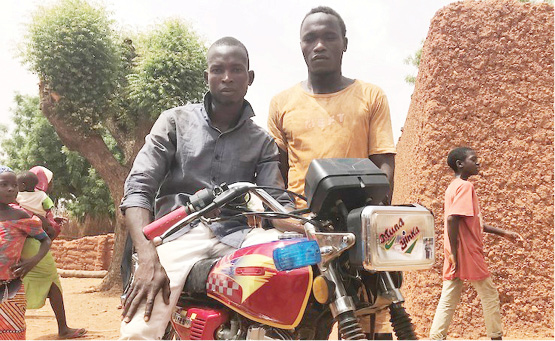Youth participation, key to ending open defecation
When Abdullahi Yinusa, 25, is not farming, he spends time riding his motorcycle around Yammawar Kafawa community in Dambatta Local Government Area of Kano State. He transports villagers for a small fee, which supplements the income he makes from selling his farm produce. Yinusa also spends his free time volunteering as a member of the […]

Abdulahi Yinusa and Shafiyu Abdullahi are both members of the WASH vanguards championing the need to end open defecation in Nigeria © UNICEF/Nigeria/2019.
When Abdullahi Yinusa, 25, is not farming, he spends time riding his motorcycle around Yammawar Kafawa community in Dambatta Local Government Area of Kano State. He transports villagers for a small fee, which supplements the income he makes from selling his farm produce.
Yinusa also spends his free time volunteering as a member of the community vanguards for the Water, Sanitation and Hygiene Committees (WASHCOM), a local group that supports communities to effectively manage their WASH affairs. The WASHCOM in Yammawar Kafawa community also brings various communities together to form associations at ward and local government area level.
Along with some other members of his community, including children, Yinusa was trained by the Rural Water Supply and Sanitation Agency (RUWASSA) and UNICEF, to convey messages about the importance of safe Water, Sanitation, and Hygiene (WASH) practices in Yammawar Kafawa.
“We get information from the training on what to tell households, especially housewives, on the importance of good hygiene practices,” said Yinusa.
With an estimated population of 199 million, according to recent data by UNFPA, more than half of Nigeria’s population is under 30 years of age.
“WASHCOM plays significant role in influencing the community to end open defecation and adopt safe hygiene behaviours not only among all households but also in neighbouring communities,” said Bioye Ogunjobi, WASH specialist.
“By so doing they become change agents and create a local movement raising awareness about the negative impact of open defecation in communities,” he said.
Nigeria currently ranks second among countries with the highest number of people practicing open defecation. With an ambitious goal to get the 47 million people who defecate in the open to use the toilet, the Nigerian government in November 2018 declared a state of emergency in the WASH sector; launched a national campaign tagged, ‘Clean Nigeria: Use the Toilet’, and reaffirmed its commitment to end open defecation in the country by 2025.
Although only 13 local government areas have been certified open defecation free in Nigeria, Yammawar Kafawa stands among some 70,000 communities spread across the country that have been able to achieve and sustain an open defecation free status.
Young people like Yinusa are playing a critical role in helping their communities achieve the feat through their membership of WASHCOM.
“Having been informed of the importance of not practicing open defecation, if we are pressed, we take permission from the nearest neighbour to use their toilet,” said 25-year-old Shafi’u Abdullahi, a construction worker.
“Since the beginning of this initiative, there have been no cases of diarrhoea,” Abdullahi also said.
Considering that more than 100,000 children under the age of five die yearly from WASH-related illnesses, the progress in Yammawar Kafawa could be an inspiration to other communities.
While advocating for more youth involvement in Nigeria drive to end Open Defecation, Yinusa said, communities should form youth groups as a pressure group and get (the needed) support for their communities.
UNICEF Chief of WASH, Zaid Jurii said, they encourage the involvement of more youths in WASHCOMs, support the development of economic value chain for sanitation where youths can take advantage, and create an opportunity for regular open engagement of youths in social dialogue on issues around safe sanitation.
